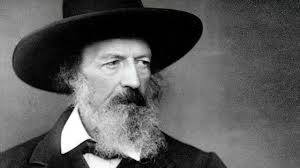 At a craft talk at Squaw Valley one year, Bob Hass said something like this: No one can say whose work will last. Alfred Lord Tennyson was the most famous poet of his day. But who reads him now? The important thing is to wrestle with our own demons, to get that struggle into our work. As for its worth, that’s not up to any of us to know.
At a craft talk at Squaw Valley one year, Bob Hass said something like this: No one can say whose work will last. Alfred Lord Tennyson was the most famous poet of his day. But who reads him now? The important thing is to wrestle with our own demons, to get that struggle into our work. As for its worth, that’s not up to any of us to know.
I don’t read Tennyson either, although I did love the strong, almost irresistible music of his work when I was first reading poems. And many of his lines remain in my memory. So here is a poem of his, and afterwards, a poem of mine on a very similar theme. Not that I equate my work with his, but because the work itself is all there is, and we are all struggling to get it down on the page, famous or not.
Break, Break, Break
Break, break, break,
On thy cold gray stones, O Sea!
And I would that my tongue could utter
The thoughts that arise in me.
O, well for the fisherman’s boy,
That he shouts with his sister at play!
O, well for the sailor lad,
That he sings in his boat on the bay!
And the stately ships go on
To their haven under the hill;
But O for the touch of a vanished hand,
And the sound of a voice that is still!
Break, break, break,
At the foot of thy crags, O Sea!
But the tender grace of a day that is dead
Will never come back to me.
Alfred Lord Tennyson
* * *
Thinking of Peter
A week past the 29th anniversary of your death
I read Seamus Heaney’s poem about the kite, and
my first thought is to show it to you.
So I stumble again
into the hole
death leaves,
unfillable.
This dim morning
of a day that promises
to be beautiful
without your presence
except for this faint ache
because you loved kites,
their unpredictable dialog
with the wind
transmitted to your hand.
That hand gone
and gone again
each time
I reach for it.
Meryl Natchez
All hands on deck!
These are beautiful and they hit me, wave after wave.
I often think of the opening lines of the Tennyson poem…wave after wave